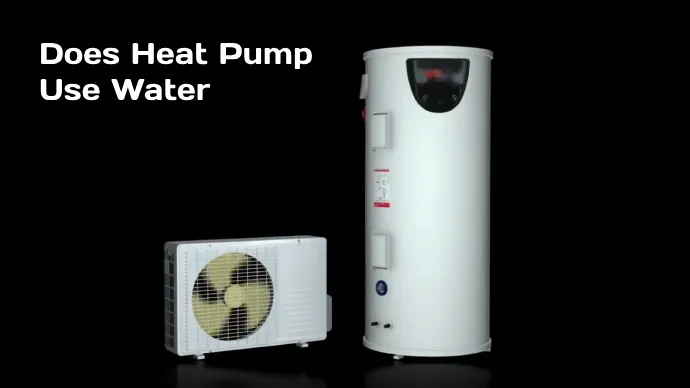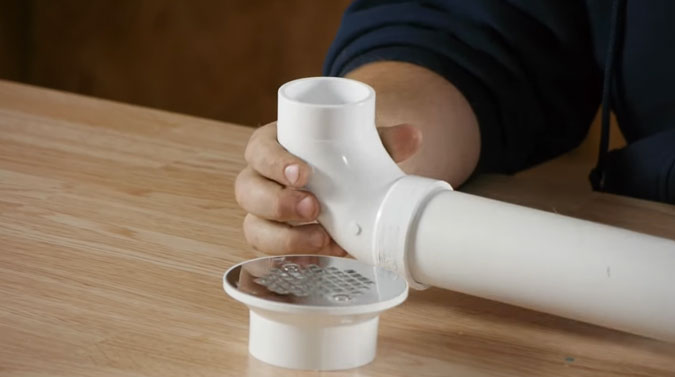Last Updated on June 18, 2023
For heat pumps to work, you may wonder whether water is utilized in their operation. Heat pumps need water to work, but unlike air-source heat pumps that get heat from the air, water-source heat pumps get heat from the water.
The water goes through pipes and into the heat pump, where it’s used to warm up the refrigerant. Through some fancy compressing and expanding, the refrigerant converts the heat into useful heat that heats up your home.
Let’s look into how a heat pump water heater works, how much water it actually uses, and other neat facts.
Why Does a Heat Pump Use Water?

When you ask why heat pumps use water, there are several reasons to consider. Here’s a quick overview:
1. High specific heat capacity
2. High thermal conductivity
3. Wide operating temperature range
4. Availability and low cost
Let’s get into it:
1. High Specific Heat Capacity
Water has a high specific heat capacity, meaning it can absorb and store significant heat energy without undergoing a large temperature change. This property is what makes water an essential component in heat pump systems.
When a heat pump is in operation, the compressed gas releases heat energy, which is then absorbed by the water in the heat exchanger.
The water then transfers the heat to the heat pump’s refrigerant, which is then compressed and heated further. This process allows the heat pump to efficiently capture and retain heat, making it an effective heating system for homes and buildings.
Without water’s high specific heat capacity, heat pumps wouldn’t be as effective at heating and cooling spaces.
2. High Thermal Conductivity
With its remarkable ability to swiftly transfer heat, water plays a crucial role in facilitating the heat transfer process in heat pump systems.
This is due to its high thermal conductivity, which allows it to absorb heat efficiently when it comes into contact with the hot compressed gas.
The cool water absorbs the heat from the hot gas and carries it away to be used for heat in the heat pump system. Geothermal heat pumps also benefit from water’s high thermal conductivity.
In these systems, water is pumped through underground pipes, where the earth’s temperature is more constant than the air above. As the water flows through the pipes, it absorbs heat from the earth and carries it back to the heat pump system, which can be used for heating purposes.
3. Wide Operating Temperature Range
Due to its broad temperature range, you can utilize water in your heat transfer process. This allows for efficient heat transfer across a wide spectrum of temperatures, making it an ideal medium for both traditional and geothermal heat pump systems.
Heat pumps rely on transferring thermal energy from one location to another. Water’s ability to maintain its liquid state over various temperatures makes it a great candidate for heat exchange.
The specific heat capacity of water is high, which means it can absorb and store large amounts of heat energy without undergoing a significant temperature change. This property enables water to transfer heat efficiently, making it an effective medium for heat exchange in both heating and cooling applications.
Water’s wide temperature range also accommodates different heat pump applications. This makes it a versatile and reliable medium for heat transfer.
4. Availability and Low Cost
If you’re looking for an affordable and easily accessible resource for your heat transfer needs, consider utilizing water due to its abundance and low cost.
Water is one of the most widely available substances on earth and can be sourced from lakes, rivers, and even underground aquifers.
Water is typically much cheaper than other refrigerants or fluids, making it a cost-effective choice for heat pump systems. Using water in heat pump systems also helps to reduce logistical challenges.
Unlike other refrigerants or fluids that may require specialized handling or be subject to environmental regulations, water is a universally accepted resource that can be easily transported and utilized.
Using water in heat transfer applications is also more environmentally sustainable, as it doesn’t contribute to ozone depletion or global warming.
How does the heat pump use water?

Heat pumps use water to transfer heat from one reservoir to another, a process commonly known as water-source heat pumps.
These pumps extract heat from a body of water, such as a river, lake, or pond, which they use to warm up spaces. They cool the hot compressed gas of the heat pump’s compressor by passing water through it.
The cool water absorbs heat and exits at a higher temperature, while the refrigerant exits as a low-pressure liquid. In the end, with the help of a heat pump, the extracted heat from a water body is converted into useful heat to warm up homes or other spaces.
How much water do heat pumps use?
The amount of source water flow required per ton of heating capacity for most heat pumps ranges from two to three gallons per minute. Residential heat pumps typically demand between six and 12 gallons of water per minute whenever they’re operating.
This means that a heat pump’s water can be significantly higher than other heating systems, such as furnaces or boilers.
Paying attention to the water flow rate is important to ensure that your heat pump is operating optimally. If your heat pump needs to receive more water, it can lead to decreased efficiency and even cause damage to the system.
On the other hand, if the water flow rate is too high, it can lead to excessive wear and tear on the system.
How long does the heat pump take to heat water?
The time it takes for a heat pump water heater to heat water depends on various factors, including the desired temperature, the initial temperature of the water, and the specific model and settings of the heat pump.
In a regular setting, the recovery time of a heat pump water heater can be around 2 hours. This means that after depleting the hot water supply, the heat pump would take approximately 2 hours to heat a new batch of water to the desired temperature.
Many heat pump water heaters offer a high-demand setting, which significantly reduces the waiting time.
With the high-demand setting activated, the heat pump can heat water much faster, typically within 60 to 80 minutes.
This setting is particularly useful in situations where there is a higher demand for hot water, such as during periods of increased usage or when multiple hot water fixtures are being used simultaneously.
How much electricity does a heat pump water heater use?

The electricity consumption of a heat pump water heater will vary depending on several factors, including the model, size, usage patterns, and the cost of electricity in the specific location.
On average, a heat pump water heater uses around 2,195 kilowatt-hours (kWh) of electricity per year. It’s worth noting that energy usage may increase with larger tank sizes, as more energy is required to heat a larger volume of water.
Also the cost of electricity in a particular area also plays a significant role in determining the overall electricity expenses associated with operating a heat pump water heater.
Can a heat pump run without water?
A heat pump can’t function without a proper water supply, so always filling your water tank is crucial. Without water, the heat pump won’t be able to extract heat from the environment and transfer it into your home.
The heat pump works by circulating refrigerant through a loop that passes through an evaporator, compressor, condenser, and expansion valve. During this process, the refrigerant absorbs heat from the air or ground outside and releases it inside your home.
If your heat pump is running without water, it can cause major problems to the system. The compressor will overheat and eventually fail, resulting in expensive repair costs.
Maximize Your Heat Pump’s Efficiency with Water
It is clear that water plays a vital role in the operation of heat pumps. They use special pipes to grab heat from water sources to keep your pad warm or cool.
Also, they use water to chill the compressor and soak up heat from the refrigerant, which makes the whole system work better. It’s not just about comfort, though, using water is way better for the environment.
Heat pumps are basically the future of home heating and cooling, and leaning on water helps make this tech more eco-friendly.


